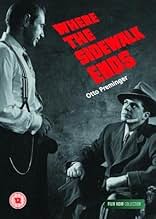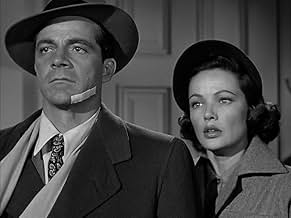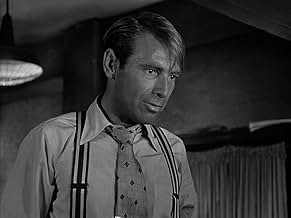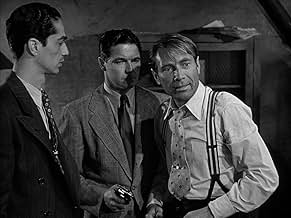AVALIAÇÃO DA IMDb
7,5/10
11 mil
SUA AVALIAÇÃO
O Detetive Mark Dixon quer ser algo que seu pai não era: um homem do lado certo da lei. Será que a natureza viciosa de Dixon levara o melhor sobre ele?O Detetive Mark Dixon quer ser algo que seu pai não era: um homem do lado certo da lei. Será que a natureza viciosa de Dixon levara o melhor sobre ele?O Detetive Mark Dixon quer ser algo que seu pai não era: um homem do lado certo da lei. Será que a natureza viciosa de Dixon levara o melhor sobre ele?
- Direção
- Roteiristas
- Artistas
- Prêmios
- 1 vitória no total
Fred Aldrich
- Detective at Staff Meeting
- (não creditado)
Don Appell
- Willie Bender
- (não creditado)
David Bauer
- Sid Kramer
- (não creditado)
Eddie Borden
- Pool Hall Patron
- (não creditado)
Neville Brand
- Steve
- (não creditado)
Barry Brooks
- Thug
- (não creditado)
Ralph Brooks
- Railroad Baggage Clerk
- (não creditado)
Oleg Cassini
- Oleg
- (não creditado)
John Close
- Hanson
- (não creditado)
Avaliações em destaque
I'm a big fan of fan of film noir, and this film by Otto Preminger easily stands as one of the best that I've seen! Preminger has reunited two of his stars from the hit 'Laura' - Gene Tierney and Dana Andrews, for an entirely different sort of crime film. Laura was based around love, and this film is based around hate; as we watch police detective Mark Dixon, a copper already suffering scrutiny from his superiors for his heavy handed tactics, accidentally kill a suspect and try to pin the murder on a known criminal; a man by the name of Tommy Scalisi. The plot is brilliantly worked, and Preminger excellently balances several plot points; but it all comes back down to the main moral implication surrounding our main character. The fact that the film is set in the criminal underground means that the plot is given an excellent base to work from, and director Otto Preminger expertly captures the sleazier side of life by showing the main characters gambling, beating one another (and their women), shooting and more - and this also helps to offset the film from the earlier 'Laura', which was very much set in upper class society.
The role of Mark Dixon gives Dana Andrews one of the most interesting parts of his career. Here, we have a character that is difficult to like as he's so cold - but the fact that we can understand his motives ensures that he's easy to sympathise with, and that allows the audience the ability to plug into his plight. The character development is well timed, and as we've follows this character and his motivations throughout the film; everything makes sense by the end. His co-star is the beautiful Gene Tierney, who isn't given as much to do in this film as she was in Laura; a film that made Tierney its linchpin. She does well with what she's got, however, and the lead duo's chemistry is excellent and Tierney helps to complete every scene she's in. I can't say that this is a better film than the earlier Laura; that's a hard act to follow, but this film certainly fits into the film noir formula better than Preminger's earlier film. The film also makes a good comparison piece for Laura; as just about everything in this film is opposite to the 1944 movie, yet it's all strangely familiar. Highly recommended to all!
The role of Mark Dixon gives Dana Andrews one of the most interesting parts of his career. Here, we have a character that is difficult to like as he's so cold - but the fact that we can understand his motives ensures that he's easy to sympathise with, and that allows the audience the ability to plug into his plight. The character development is well timed, and as we've follows this character and his motivations throughout the film; everything makes sense by the end. His co-star is the beautiful Gene Tierney, who isn't given as much to do in this film as she was in Laura; a film that made Tierney its linchpin. She does well with what she's got, however, and the lead duo's chemistry is excellent and Tierney helps to complete every scene she's in. I can't say that this is a better film than the earlier Laura; that's a hard act to follow, but this film certainly fits into the film noir formula better than Preminger's earlier film. The film also makes a good comparison piece for Laura; as just about everything in this film is opposite to the 1944 movie, yet it's all strangely familiar. Highly recommended to all!
An excellent opening title sequence starts this gritty Noir off in perfect step with what will follow. The son of a thief who was killed while attempting to shoot himself out of jail, Mark Dixon became a cop in an attempt to atone for the sins of the father, but cannot quite escape the fathers blood surging through his veins every time he strikes out at a hood, and it's his excessive use of force that gets him demoted with the threat of losing his job as detective, the only thing he ever wanted out of life. When he accidentally kills a witness to a murder, panic takes hold of him and he proceeds to cover up the evidence, but fate has a way of meting out cruel justice. Mark will fall in love for his victim's ex, and then her innocent uncle through another freak accident ends up taking the rap for the murder when the body turns up. And now the real moment of truth - atone for his own sins and free an innocent man, but probably lose the girl, or say nothing, keep the girl, but end up being just like his father? A brilliantly executed noir by Preminger and Dana Andrews nails one of the best performances of his career as the tormented detective.
Despite the lack of a haunting theme song and the austere and humourous presence of Clifton Webb, this film is a much more exciting experience than "Laura", the other collaboration between Preminger, Andrews and Tierney. This is one of the grimmest film noir films I've ever seen, and not just in its lurid shadows and rain-drenched streets. The film is dark to its very soul. Dana Andrews plays what is now a standard stereotype: the cop who is bitter and deadly with his temper. But Andrews plays it with more honesty and humanity than most any other angry movie cop you're likely to see. Despite the fact that his character is good at heart, he is also a criminal and a killer, and the film beautifully strings him along, forcing him to serve his spiritual penance. What of course is most fun is the way that his terror over being discovered slowly comes to a boil. I've seen tons of film noir movies but I can't recall ever seeing the protagonist ever becoming the anti-hero in such a startling way. Many of the best film noir pics have that dizzying spiral theme of a man trapped by his own weakness. "Night in the City", "Detour", "Scarlet Street", "In a Lonely Place", "Act of Violence" and "Johnny Eager", are among the best of them. "Were the Sidewalk Ends" holds its own among them. Not a bad recommendation!
Elegance and class are not always the first words that come to mind when folks (at least folks who might do such a thing) sit around and talk about film noir.
Yet some of the best films of the genre, "Out of the Past," "The Killers," "In A Lonely Place," "Night and the City," manage a level of sleek sophistication that elevates them beyond a moody catch phrase and its connotations of foreboding shadows, fedoras, and femme-fatales.
"Where the Sidewalk Ends," a fairly difficult to find film -- the only copy in perhaps the best stocked video store in Manhattan was a rough bootleg from the AMC cable channel -- belongs in a category with these classics.
From the moment the black cloud of opening credits pass, a curtain is drawing around rogue loner detective Marc Dixon's crumbling world, and as the moments pass, it inches ever closer, threatening suffocation.
Sure, he's that familiar "cop with a dark past", but Dana Andrews gives Dixon a bleak stare and troubled intensity that makes you as uncomfortable as he seems. And yeah, he's been smacking around suspects for too long, and the newly promoted chief (Karl Malden, in a typically robust and commanding outing) is warning him "for the last time."
Yet Dixon hates these thugs too much to stop now. And boy didn't they had have it coming?
"Hoods, dusters, mugs, gutter nickel-rats" he spits when that tough nut of a boss demotes him and rolls out all of the complaints the bureau has been receiving about Dixon's right hook. The advice is for him to cool off for his own good. But instead he takes matters into his own hands.
And what a world of trouble he finds when he relies on his instincts, and falls back on a nature that may or may not have been passed down from a generation before.
Right away he's in deep with the cops, the syndicate, his own partner. Dixon's questionable involvement in a murder "investigation" threatens his job, makes him wonder whether he is simply as base as those he has sworn to bring in. Like Bogart in "Lonely Place," can he "escape what he is?"
When he has nowhere else to turn, he discovers that he has virtually doomed his unexpected relationship with a seraphic beauty (the marvelous Gene Tierney) who seems as if she can turn his barren bachelor's existence into something worth coming home to.
The pacing of this superb film is taut and gripping. The group of writers that contributed to the production polished the script to a high gloss -- the dialogue is snappy without disintegrating into dated parody fodder, passionate without becoming melodramatic or sappy.
And all of this top-notch direction and acting isn't too slick or buffed to loosen the film's emotional hold. Gene Tierney's angelic, soft-focus beauty is used to great effect. She shows herself to be an actress of considerable range, and her gentle, kind nature is as boundless here as is her psychosis in "Leave Her to Heaven." The scenes between Tierney and Andrews's Dixon grow more intense and touching the closer he seems to self-destruction.
Near the end of his rope, cut, bruised, and exhausted Dixon summarizes his lot: "Innocent people can get into terrible jams, too,.." he says. "One false move and you're in over your head."
Perhaps what makes this film so totally compelling is the sense that things could go wildly wrong for almost anyone -- especially for someone who is trying so hard to do right -- with one slight shift in the wind, one wrong decision or punch, or, most frighteningly, due to factors you have no control over. Noir has always reflected the darkest fears, brought them to the surface. "Where the Sidewalk Ends" does so in a realistic fashion.
(One nit-pick of an aside: This otherwise sterling film has a glaringly poor dub of a blonde model that wouldn't seem out of place on Mystery Science Theater. How very odd.)
But Noir fans -- heck, ANY movie fans -- who haven't seen this one are in for a terrific treat.
Yet some of the best films of the genre, "Out of the Past," "The Killers," "In A Lonely Place," "Night and the City," manage a level of sleek sophistication that elevates them beyond a moody catch phrase and its connotations of foreboding shadows, fedoras, and femme-fatales.
"Where the Sidewalk Ends," a fairly difficult to find film -- the only copy in perhaps the best stocked video store in Manhattan was a rough bootleg from the AMC cable channel -- belongs in a category with these classics.
From the moment the black cloud of opening credits pass, a curtain is drawing around rogue loner detective Marc Dixon's crumbling world, and as the moments pass, it inches ever closer, threatening suffocation.
Sure, he's that familiar "cop with a dark past", but Dana Andrews gives Dixon a bleak stare and troubled intensity that makes you as uncomfortable as he seems. And yeah, he's been smacking around suspects for too long, and the newly promoted chief (Karl Malden, in a typically robust and commanding outing) is warning him "for the last time."
Yet Dixon hates these thugs too much to stop now. And boy didn't they had have it coming?
"Hoods, dusters, mugs, gutter nickel-rats" he spits when that tough nut of a boss demotes him and rolls out all of the complaints the bureau has been receiving about Dixon's right hook. The advice is for him to cool off for his own good. But instead he takes matters into his own hands.
And what a world of trouble he finds when he relies on his instincts, and falls back on a nature that may or may not have been passed down from a generation before.
Right away he's in deep with the cops, the syndicate, his own partner. Dixon's questionable involvement in a murder "investigation" threatens his job, makes him wonder whether he is simply as base as those he has sworn to bring in. Like Bogart in "Lonely Place," can he "escape what he is?"
When he has nowhere else to turn, he discovers that he has virtually doomed his unexpected relationship with a seraphic beauty (the marvelous Gene Tierney) who seems as if she can turn his barren bachelor's existence into something worth coming home to.
The pacing of this superb film is taut and gripping. The group of writers that contributed to the production polished the script to a high gloss -- the dialogue is snappy without disintegrating into dated parody fodder, passionate without becoming melodramatic or sappy.
And all of this top-notch direction and acting isn't too slick or buffed to loosen the film's emotional hold. Gene Tierney's angelic, soft-focus beauty is used to great effect. She shows herself to be an actress of considerable range, and her gentle, kind nature is as boundless here as is her psychosis in "Leave Her to Heaven." The scenes between Tierney and Andrews's Dixon grow more intense and touching the closer he seems to self-destruction.
Near the end of his rope, cut, bruised, and exhausted Dixon summarizes his lot: "Innocent people can get into terrible jams, too,.." he says. "One false move and you're in over your head."
Perhaps what makes this film so totally compelling is the sense that things could go wildly wrong for almost anyone -- especially for someone who is trying so hard to do right -- with one slight shift in the wind, one wrong decision or punch, or, most frighteningly, due to factors you have no control over. Noir has always reflected the darkest fears, brought them to the surface. "Where the Sidewalk Ends" does so in a realistic fashion.
(One nit-pick of an aside: This otherwise sterling film has a glaringly poor dub of a blonde model that wouldn't seem out of place on Mystery Science Theater. How very odd.)
But Noir fans -- heck, ANY movie fans -- who haven't seen this one are in for a terrific treat.
At first glance, it would seem natural to compare Where the Sidewalk Ends with Laura. Both have noirish qualities, both were directed by Otto Preminger, and both star Dana Andrews and Gene Tierney. But that's where most of the comparisons end. Laura dealt with posh, sophisticated people with means who just happen to find themselves mixed-up in a murder. Where the Sidewalk Ends is set in a completely different strata. These are people with barely two nickels to rub together who are more accustomed to seeing the underbelly of society than going to fancy dress parties. Where the Sidewalk ends is a gritty film filled with desperate people who solve their problems with their fists or some other weapon. Small-time hoods are a dime-a-dozen and cops routinely beat confessions out of the crooks. Getting caught-up in a murder investigation seems as natural as breathing.
While I haven't seen his entire body of work, based on what I have seen, Dana Andrews gives one of his best performances as the beat-down cop, Det. Sgt. Mark Dixon. He's the kind of cop who is used to roughing up the local hoods if it gets him information or a confession. One night, he goes too far and accidentally kills a man. He does his best to cover it up. But things get complicated when he falls for the dead man's wife, Morgan Taylor (Tierney), whose father becomes suspect number one in the murder case. As Morgan's father means the world to her, Dixon's got to do what he can to clear the old man without implicating himself.
Technically, Where the Sidewalk Ends is outstanding. Besides the terrific performance from Andrews, the movie features the always delightful Tierney. She has a quality that can make even the bleakest of moments seem brighter. The rest of the cast is just as solid with Tom Tully as the wrongly accused father being a real standout. Beyond the acting, the direction, sets, lighting, and cinematography are all top-notch. Overall, it's an amazingly well made film.
If I have one complaint (and admittedly it's a very, very minor quibble) it's that Tierney is almost too perfect for the role and her surroundings. It's a little difficult to believe that a woman like that could find herself mixed-up with some of these unsavory characters. It's not really her fault, it's just the way Tierney comes across. She seems a little too beautiful, polished, and delicate for the part. But, her gentle, kind, trusting nature add a sense of needed realism to her portrayal.
While I haven't seen his entire body of work, based on what I have seen, Dana Andrews gives one of his best performances as the beat-down cop, Det. Sgt. Mark Dixon. He's the kind of cop who is used to roughing up the local hoods if it gets him information or a confession. One night, he goes too far and accidentally kills a man. He does his best to cover it up. But things get complicated when he falls for the dead man's wife, Morgan Taylor (Tierney), whose father becomes suspect number one in the murder case. As Morgan's father means the world to her, Dixon's got to do what he can to clear the old man without implicating himself.
Technically, Where the Sidewalk Ends is outstanding. Besides the terrific performance from Andrews, the movie features the always delightful Tierney. She has a quality that can make even the bleakest of moments seem brighter. The rest of the cast is just as solid with Tom Tully as the wrongly accused father being a real standout. Beyond the acting, the direction, sets, lighting, and cinematography are all top-notch. Overall, it's an amazingly well made film.
If I have one complaint (and admittedly it's a very, very minor quibble) it's that Tierney is almost too perfect for the role and her surroundings. It's a little difficult to believe that a woman like that could find herself mixed-up with some of these unsavory characters. It's not really her fault, it's just the way Tierney comes across. She seems a little too beautiful, polished, and delicate for the part. But, her gentle, kind, trusting nature add a sense of needed realism to her portrayal.
Você sabia?
- CuriosidadesThe only feature film appearance for fashion and costume designer Oleg Cassini, who was married to Gene Tierney at the time. They would divorce in 1952. Reportedly, Cassini talked director Otto Preminger into giving him the part.
- Erros de gravaçãoWhen Dixon is staging the murder scene after Ken Paine' death, he is gloveless. A few seconds later he has gloves on both hands.
- Citações
[to Detective Dixon]
Insp. Nicholas Foley: Your job is to detect criminals, not to punish them.
- Cenas durante ou pós-créditosThe opening credits start as chalk writing on a sidewalk with someone walking over them and whistling.
- ConexõesFeatured in Gene Tierney: Final Curtain for a Noir Icon (2008)
Principais escolhas
Faça login para avaliar e ver a lista de recomendações personalizadas
- How long is Where the Sidewalk Ends?Fornecido pela Alexa
Detalhes
- Data de lançamento
- País de origem
- Idioma
- Também conhecido como
- Al borde del peligro
- Locações de filme
- 58 Pike Street, Manhattan, Nova Iorque, Nova Iorque, EUA(Ken Paine's apartment - between Madison and Monroe Streets - since demolished. Note Manhattan Bridge in the background)
- Empresa de produção
- Consulte mais créditos da empresa na IMDbPro
Bilheteria
- Orçamento
- US$ 1.475.000 (estimativa)
- Tempo de duração
- 1 h 35 min(95 min)
- Cor
- Proporção
- 1.37 : 1
Contribua para esta página
Sugerir uma alteração ou adicionar conteúdo ausente








































